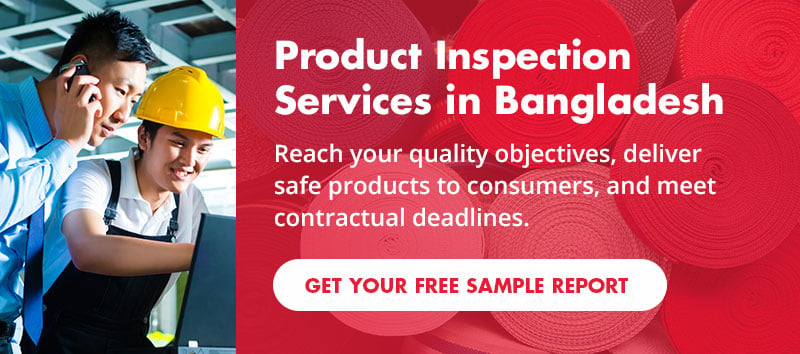
When delivering exceptional products, maintaining quality and a stellar market reputation is paramount. Consumers have high expectations, and meeting those demands is essential for success. Moreover, you will also need to keep up with the competition and meet or exceed the quality of their products. That's where pre-shipment inspections come into play. This article explains how pre-shipment inspections elevate product quality and market reputation.
What are Pre-Shipment Inspections
Pre-shipment inspections are a vital quality control measure conducted before products are shipped from the manufacturing facility to the customer or the market. These inspections thoroughly examine the goods to ensure they meet predetermined quality standards, specifications, and regulatory requirements. Skilled inspectors or inspection agencies are tasked with assessing various aspects of the products, including their functionality, appearance, performance, and safety.
By conducting pre-shipment inspections, businesses can identify and rectify any defects, non-conformities, or discrepancies before the products reach consumers. This proactive approach ensures that customers receive high-quality products and helps companies maintain their market reputation for delivering excellence.
How Pre-Shipment Inspections Elevate Product Quality and Market Reputation
Pre-shipment inspections are crucial in ensuring that your products meet stringent quality standards before they reach the market. By implementing them, you can reap several benefits that contribute to the growth and success of your business.
First and foremost, pre-shipment inspections maintain consistent product quality. With them in place, you can catch any potential issues or defects before your products leave the manufacturing facility. A pre-shipment inspection can also help you identify issues with packaging quality control. By identifying and rectifying these issues early on, you can safeguard against the delivery of subpar goods, preserving your reputation for excellence.
Minimizing risks and potential issues is yet another advantage of pre-shipment inspection. They allow you to identify defects, non-conformities, or discrepancies between the product and the agreed-upon specifications. By catching these issues beforehand, you can prevent costly returns, minimize customer complaints, and avoid damaging your market reputation.
Meeting customer expectations is another key benefit of pre-shipment inspection. By meticulously scrutinizing the products before they leave the factory, you can ensure that they adhere to the specifications and requirements. This attention to detail demonstrates your commitment to providing top-notch products, fostering customer satisfaction and loyalty.
Furthermore, pre-shipment inspections strengthen supplier relationships. Regularly conducting them sends a clear message to your suppliers that you value transparency, accountability, and commitment to quality. This collaborative approach builds trust and fosters a stronger partnership, enabling you to work together more effectively to deliver exceptional products.
Avoiding Expensive Fees Through Pre-Shipment Inspections
Implementing pre-shipment inspections can save businesses from incurring expensive fees and penalties while minimizing storage costs. Companies can identify potential issues or non-compliance with regulations, standards, or contractual agreements by conducting these inspections before products are shipped. This proactive approach allows them to rectify any problems or defects early on, reducing the likelihood of rejected shipments or costly returns, which can be essential for small businesses or e-commerce sellers. Additionally, pre-shipment inspections help businesses avoid penalties imposed by regulatory bodies for non-compliance with safety, quality, or labeling requirements, preventing further storage expenses for non-conforming products.
Unfortunately, if a pre-inspection reveals any issues, you might need to store your products until the problems are resolved. However, storing inventory at your production facility is usually complicated. To get around this issue, the experts from Royal Moving Company suggest looking into professional storage solutions to house your excess inventory. Thankfully, by investing in quality control through pre-shipment inspections, companies can mitigate the risk of expensive fees, reduce storage costs, and ensure that their products meet the necessary standards, ultimately saving them time, money, and potential reputational damage.
The Pre-Shipment Inspection Process
Implementing pre-shipment inspections involves a systematic process that ensures thorough evaluations of your products. Let's take a closer look at the key steps involved:
- Selecting an inspection agency or team: It's crucial to emphasize the significance of working with a reputable third-party quality control company. There are several reasons why this choice holds immense value. Firstly, such companies possess extensive experience, allowing them to bring a wealth of knowledge to the table. Additionally, their expertise often spans multiple industries, providing a broader perspective that can benefit your specific field. Moreover, these agencies typically adhere to robust ethical policies, ensuring a higher standard of integrity and accountability. Therefore, partnering with a well-established third-party quality control company should be a priority when considering inspection options rather than assembling an in-house team.
- Defining inspection criteria and requirements: Establish clear quality benchmarks and outline specific attributes the inspectors should evaluate during the inspection process.
- Conducting on-site inspections: Inspectors will select samples from the production line based on the Acceptance Quality Limit (AQL) and conduct a comprehensive examination to assess the product quality against the established criteria.
- Documenting and reporting findings: Inspectors will provide detailed inspection reports, documenting their findings and highlighting any issues or non-conformities discovered during the inspection. It is crucial for the client to engage in effective communication with suppliers and stakeholders during this stage.
Key Considerations for Implementing Pre-Shipment Inspections
For maximizing the benefits of pre-shipment inspections, there are several important considerations to keep in mind:
- Incorporating inspections into the supply chain management process is crucial. Integrate them seamlessly into your production timelines to ensure they align with your shipping schedules. Doing so can avoid unnecessary delays while maintaining a robust quality control process.
- Setting clear expectations with suppliers is vital for successful pre-shipment inspections. Communicate the purpose and advantages of these inspections, ensuring suppliers understand their role in enhancing product quality and protecting your market reputation. It's equally important to outline the consequences of non-compliance to motivate adherence to quality standards.
- Monitoring and analyzing inspection data are essential to improve your pre-shipment inspection process continuously. By tracking trends and patterns in the inspection data, you can identify areas for improvement and take proactive measures to address them. This data-driven approach helps you make informed decisions and optimize quality control efforts.
Conclusion
The best way to stand out in any competitive market is to let your products speak for themselves since the quality of your products and your reputation as a brand are inseparable. Pre-shipment inspections provide the tools to safeguard against quality issues, demonstrate your commitment to excellence, and build customer trust. So, don't overlook the power of pre-shipment inspections—invest in quality and watch your market reputation soar. Remember, they elevate product quality and market reputation, and by incorporating them into your business practices, you'll be on your way to delivering outstanding products that set you apart from the competition







